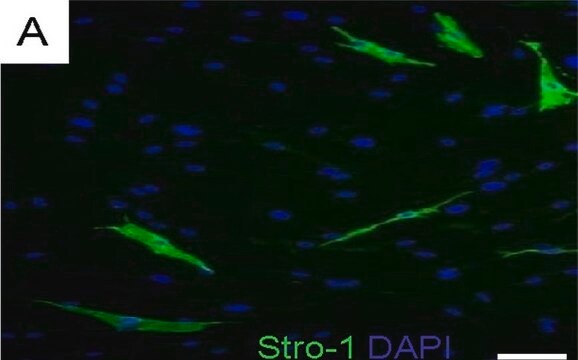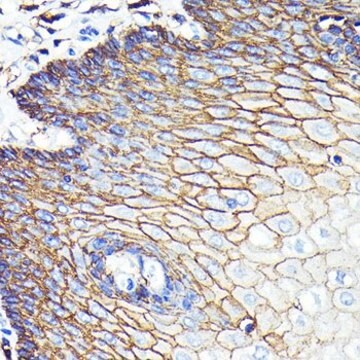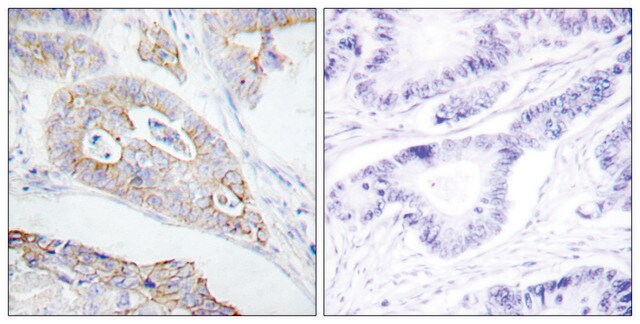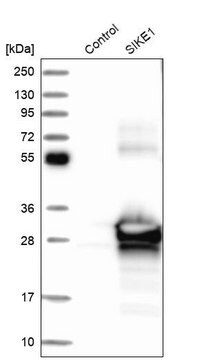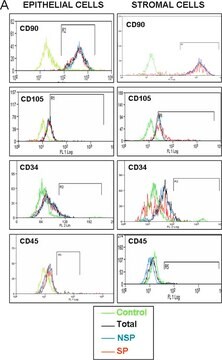CBL154
Anti-H-CAM Antibody, clone F10-44-2
clone F10-44-2, Chemicon®, from mouse
Synonim(y):
CD44
About This Item
Polecane produkty
pochodzenie biologiczne
mouse
Poziom jakości
forma przeciwciała
affinity isolated antibody
rodzaj przeciwciała
primary antibodies
klon
F10-44-2, monoclonal
reaktywność gatunkowa
human
producent / nazwa handlowa
Chemicon®
metody
flow cytometry: suitable
immunohistochemistry (formalin-fixed, paraffin-embedded sections): suitable
immunoprecipitation (IP): suitable
izotyp
IgG2a
numer dostępu NCBI
numer dostępu UniProt
Warunki transportu
wet ice
docelowa modyfikacja potranslacyjna
unmodified
informacje o genach
human ... CD44(960)
Powiązane kategorie
Zastosowanie
Studies involving T, B cell, monocyte, granulocyte T and B cell binding to HEV during lymphocyte circulation and movement of leucocytes to inflammatory sites.
Studies on HCAM (homing receptor) function.
Immunoprecipitation.
Optimal working dilutions must be determined by the end user.
Postać fizyczna
Komentarz do analizy
POSITIVE CONTROL: Tonsil; stains all T-cells in the paracortex
Informacje prawne
Nie możesz znaleźć właściwego produktu?
Wypróbuj nasz Narzędzie selektora produktów.
Kod klasy składowania
12 - Non Combustible Liquids
Klasa zagrożenia wodnego (WGK)
WGK 2
Temperatura zapłonu (°F)
Not applicable
Temperatura zapłonu (°C)
Not applicable
Certyfikaty analizy (CoA)
Poszukaj Certyfikaty analizy (CoA), wpisując numer partii/serii produktów. Numery serii i partii można znaleźć na etykiecie produktu po słowach „seria” lub „partia”.
Masz już ten produkt?
Dokumenty związane z niedawno zakupionymi produktami zostały zamieszczone w Bibliotece dokumentów.
Produkty
Development of a novel serum-free and xeno-free human mesenchymal stem cell (MSC) osteocyte differentiation media.
Frequently asked questions about mesenchymal stem cells including MSC derivation, expansion, differentiation and allogenic stem cell therapy.
Protokoły
Information about mesenchyme, specifically mesenchymal stem cell procotols. Step-by-step cell culture protocols for mesenchymal stem cell (MSC) isolation, expansion and differentiation.
Informacje na temat mezenchymy, w szczególności protokołów mezenchymalnych komórek macierzystych. Protokoły hodowli komórkowej krok po kroku do izolacji, ekspansji i różnicowania mezenchymalnych komórek macierzystych (MSC).
Nasz zespół naukowców ma doświadczenie we wszystkich obszarach badań, w tym w naukach przyrodniczych, materiałoznawstwie, syntezie chemicznej, chromatografii, analityce i wielu innych dziedzinach.
Skontaktuj się z zespołem ds. pomocy technicznej